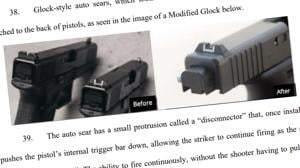(The Center Square) – Chicago is expanding its lawsuit against gun manufacturer Glock, but a gun rights advocate says it’s misguided and likely unconstitutional.
Last year, Illinois Gov. J.B. Pritzker enacted a measure allowing lawsuits against the firearms industry for allegedly making the community less safe. The National Shooting Sports Foundation challenged the law. The state said no one has been harmed and the case should be dismissed. A ruling is pending on whether to enjoin the law or dismiss the case.
Separately earlier this year, the city of Chicago used the state law to sue Glock, alleging the company makes semi-automatic handguns that can be made full-auto with aftermarket parts the Glock does not manufacture. The city dropped its initial lawsuit but filed an expanded one Tuesday.
“These terrifying weapons have caused death and destruction throughout Chicago: they have been recovered in connection with homicides, aggravated assaults, batteries, kidnappings, burglaries, home invasions, carjackings, and attempted robberies,” the lawsuit filed in Cook County Circuit Court says.
The expanded lawsuit includes Glock, Glock’s parent company in Austria, and several firearms retailers. They acknowledge the so-called “auto sear” or “Glock switch” is not manufactured by Glock.
“Many auto sears are even sold with the Glock logo printed on them, even though Glock does not manufacture them,” the lawsuit said. “Glock has been warned by the Bureau of Alcohol, Tobacco, Firearms and Explosives … about the gun’s design and knows it could fix the problem, but has chosen not to, putting profits over public safety, and violating the law.”
Second Amendment Foundation’s Alan Gottlieb said the city’s lawsuit is misguided and could be unconstitutional.
“If somebody alters the Glock and makes it an illegal gun, they should be going after the criminal who did it. And of course, Chicago has a great track record of not prosecuting criminals who misuse firearms,” Gottlieb told The Center Square Wednesday. “And that’s where the problem lies. And going after the industry is only being done because they want to put gun manufacturers out of business.”
The city’s lawsuit said Chicago has long struggled with “an epidemic of gun violence,” but said Glock and other defendants are making it worse.
“The easily modified Glock pistols sold and promoted by Defendants are sought by criminals because with the addition of a simple switch, they are capable of military grade firepower – killing and injuring higher numbers of victims and increasing the terror felt by ordinary Chicagoans,” the lawsuit said.
The city also alleged the switches can make Glock handguns fire at a rate of 1,200 rounds a minute.
Gottlieb said that’s impossible because there are no 1,200 round magazines for handguns.
“If you had to stop after firing 10 rounds and reload a magazine, there’s no way in a minute you can fire 1,200 rounds,” he said. “Again, they use this hyperbole to … go after people and make these charges in their complaints but they’re absurd.”
Amid the three count lawsuit alleging unreasonable sale, manufacturing, and/or marketing of firearms, unfair practices and deceptive practices, the city is seeking the court to block Glock and other defendants from selling their firearms to non-law enforcement Chicago residents. They also want court ordered controls over the companies and fines and costs of investigating and filing the lawsuit.
“By choosing to continue selling and marketing its easily modified pistols to Chicago non-law-enforcement consumers, including through irresponsible dealers, and refusing to implement simple changes to its pistol design, Glock has violated numerous obligations under municipal law,” the city’s lawsuit said.
Gottlieb warned legal action against a handgun manufacturer popular with police could backfire.
“Obviously law enforcement is using Glock, they put Glock out of business, they’re taking away a primary firearm police use to protect people with,” he said.
Chicago officials claim to have taken 1,300 converted handguns off the streets in the past three years.



















